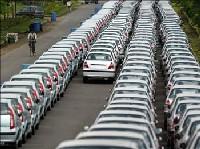 | « Back to article | Print this article |
Prospective buyers of diesel cars may have to cough up more for the engine that runs on the subsidised fuel, as the finance ministry is considering a proposal to increase the excise duty on diesel cars. This comes on account of a widening gap between retail prices of diesel and petrol.
This comes on account of a widening gap between retail prices of diesel and petrol.
Finance ministry officials said the issue had been raised several times before, but this time it was serious in the wake of huge differential between the two fuel options.
There were, however, some issues in increasing the excise duty on diesel cars, which needed to be debated, officials said.
The ministry is weighing the pros and cons of the proposals. It is debating how the collection of duty would help loss-making oil marketing companies, and in what manner it could pass on the additional resources raised from duty on diesel cars to these companies to reduce the impact of rising crude prices on their profitability.
Another issue the finance ministry needs to resolve is that how much and in what form the tax receipts from diesel cars should be raised. The government can increase duties outside the Budget under the emergency powers given in the Central Excise Tariff Act.
The option is used in case of urgency.
"We will have to create a new slab for increasing the duty on diesel cars or add a specific amount over and above the duty (for instance, 10 per cent plus Rs 12,000). The industry, however, is against specific amount because it leads to distortion. There is also an option to levy surcharge," said an official.
The finance ministry will also have to decide on the tax treatment of hybrid engines which run on dual fuel options and are encouraged by many governments all over the world.
An experts' group headed by Planning Commission member Kirit Parikh had suggested a higher tax on diesel cars to compensate for differential pricing.
In March, the Delhi government had imposed an additional levy of 25 per cent on diesel vehicles.
However, world over there is no difference in the duty structure of petrol and diesel cars. India also has not done this differentiation so far.
At present, the government levies an excise duty of 10 per cent on small cars and 22 per cent plus Rs 15,000 on big cars.
The difference between the retail prices of petrol and diesel has more than doubled in the last one year.
At present, petrol costs Rs 63.37 in Delhi, while diesel sells at Rs 37.75 - a difference of Rs 25.62, against a differential of Rs 11.42 in June 2010 when petrol was deregulated.
Diesel prices have not moved up since the last downward revision in September 2010, whereas petrol prices have gone up by Rs 6.81.
The finance ministry is not in favour of reducing duties on petroleum products as it would hurt its tax collections at a time when the economy is expected to grow at a rate slower than projected.
With the inflation ruling above 8 per cent for the last several months, the government is not in a position to increase diesel prices because this would further stoke up fuel inflation.